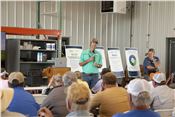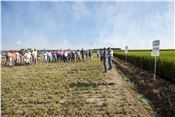Horizon Ag Varieties Spur Interest At Arkansas Field Day
BETTY VALLE-GEGG NAEGERBetty Valle Gegg-Naeger
Senior Staff Writer: MidAmerica Farmer Grower
HARRISBURG, ARKANSAS
From the launch of a new, higher-yielding rice variety to getting insight into best management practices for elite Clearfield® and Provisia® rice performers, a large crowd of farmers and consultants turned out to hear about and see the latest from Horizon Ag at its annual Arkansas Field Day.
The size of the crowd attending the event, held at the new University of Arkansas Northeast Rice Research and Extension Center at Harrisburg, confirmed farm gate interest in top-performing Horizon Ag varieties CLL16 and new CLL18, due to their potential for higher yields, premium milling quality and better return on investment.
“It was great to come to this new facility in Harrisburg and see so many of our customers and potential new customers,” said Dr. Tim Walker, Horizon Ag general manager. “They’ve been hearing a lot about how these Horizon Ag varieties are standing out on rice farms in Arkansas, the Missouri Bootheel and Mississippi, and wanted to get more information on how to get the most out of them in their operations.”
Dr. Walker noted that two of the more recent Horizon Ag varieties from University of Arkansas rice breeders are standing out based on their performance potential.
“Our most popular in the North Delta, CLL16, is being referred to as ‘the complete package’ and is a very consistent, high-yielding rice variety,” he said. “It has an excellent disease package, including blast resistance. It mills well and offers excellent package quality.
The yield performance for this variety has been off the charts, and its adaptability has been very impressive. This is a variety that has not only done well right here in northeastern Arkansas and down on the Grand Prairie, but we’ve also seen good performance in southern Louisiana and Texas.”
Early yield reports out of Louisiana and Texas this season showed CLL16 yielding over 60 barrels per acre – well over 220 bushels on a dry basis, Dr. Walker said. This is the second year CLL16 has been commercially available, and it’s Horizon Ag’s leading Clearfield variety in terms of acres planted in 2022.
“Another Arkansas-bred variety we’re excited about, one that we’ll have in a limited launch in 2023 and a full launch in 2024, is new CLL18,” said Dr. Walker. “Like CLL16, it is a conventional- statured variety, and among the things it brings to the table is its outstanding yield performance. So far, CLL18 has yielded slightly better than CLL16 in numerous trials. It’s a similar plant type, but we do get a little earlier maturity with CLL18 relative to CLL16.
These varieties can fit in tandem for farmers who plant a lot of acres in a short time when the weather allows. Planting CLL18 early in the planting season and following up with CLL16 will allow these farmers to spread out harvest and maximize the benefits of both Clearfield varieties.”
“Together, CLL16 and CLL18 can be a powerful combination for farmers focused on ROI, added Dr. Walker. “As a matter of fact, as you start looking at yield performance, true field level data, these varieties have narrowed the gap tremendously with the full-fledged hybrids, and in many situations are yielding equal to them or better.”
Another highlight at the field day was PVL03, the latest variety for the Provisia Rice System, which Horizon Ag launched in collaboration with BASF about five years ago.
“PVL03 has performed well above expectations in southeastern Louisiana and Texas,” said Dr. Walker. “We looked at some data earlier today, and it’s performing in line with some of our best Clearfield lines. The milling and package quality is stellar. We’ve had mills and some of our export markets call us and inquire about this variety because of the samples they’re seeing and the clarity of the grain.”
What’s also driving a surge in interest in PVL03 is that the Provisia Rice System has proven to be the best ACCase inhibitor technology on the market today.
“We are outperforming our competitors, by and large, in respect to grass and weedy rice control,” said Dr. Walker. “It’s extremely important for farmers to understand that, when it comes to ACCase inhibitors, Provisia is a much better product, much better technology, than our competitors. That’s important because the longevity of this system depends on us being able to steward these technologies and eradicate weedy rice. We can’t play around with it.”
Dr. Walker noted that a competitive product uses a herbicide with a safener to prevent damage to the rice. Provisia herbicide doesn’t need a safener “because we have the appropriate tolerance in our genetics,” he said.
“When you safen the herbicide, you’re going to safen its efficacy on weeds. We have to have zero tolerance out there, especially for the weedy rice, because this is the only herbicide you can spray over the top of domesticated rice and kill that weed. If we don’t kill it, it will continue to spread, and we’ll have the same problems as we had five years ago before the launch of the Provisia Rice System.”
Walker Names Speakers
In addition to presentations by Walker and some district field reps, speakers were: Zach Tanner, a rice farmer from the Missouri Bootheel, and local farmer, Nolan Evans, who farms a lot of the station property; he has some of the Horizon varieties here at the station.
Dr. Jared Hardke, UA Extension Rice specialist, provided a crop update and gave his take on UA developed CLL16 and CLL18.
“Hardke talked a lot about these two varieties, which are really step changes as far as their yield performance over previous Clearfield varities. CLL16 not only performs over a broad geography, even the coastal region; but even here in the upper Delta where there’s a lot of row rice; these varieties will perform well not only in flooded rice but also in AWD production systems where we’re pressing water management and labor management – the row rice systems - these varieties have the growth and vigor to perform extremely well. Matter of fact, as you start looking at yield performance, true field level data, these varieties have narrowed the gap tremendously with the full- fledged hybrids, and in many situations are yielding equal to them or better.
“When you look at that from a total return investment standpoint, these varieties are out front. CLL18, though we don’t have the field level data behind it right now – certainly in all the yield plot data we’ve conducted from West of Houston, to the Bootheel of Missouri – looks to have every bit as much yield potential as CLL16, if not a little more; in fact the plant structure, architecture we’re dealing with, with these varieties, are much more competitive than some of our semi dwarfs have been in recent years. ∆
BETTY VALLE GEGG-NAEGER: Senior Staff Writer, MidAmerica Farmer Grower
 The Horizon Ag team on hand in Harrisburg supporting its Arkansas Field Day were (front row, left to right) Angie Ault, operations coordinator; Dr. Tim Walker, general manager; LuElla Sprout, director of operations; and Cassie Marsh, administrative assistant. (Back row, left to right) Horizon Ag district field representatives William “Hutch” Hutchens, Chase Kagen, Jason Satterfield, Corey Conner, and Tim Jett.
The Horizon Ag team on hand in Harrisburg supporting its Arkansas Field Day were (front row, left to right) Angie Ault, operations coordinator; Dr. Tim Walker, general manager; LuElla Sprout, director of operations; and Cassie Marsh, administrative assistant. (Back row, left to right) Horizon Ag district field representatives William “Hutch” Hutchens, Chase Kagen, Jason Satterfield, Corey Conner, and Tim Jett.
Photo by John LaRose, Jr., MAFG

Dr. Jared Hardke, UA Extension Rice specialist, provided a crop update to the group and gave his take on UA developed CLL16 and CLL18.

Dr. Tim Walker, Horizon Ag general manager speaking to the crowd about Horizon Ag varieties.